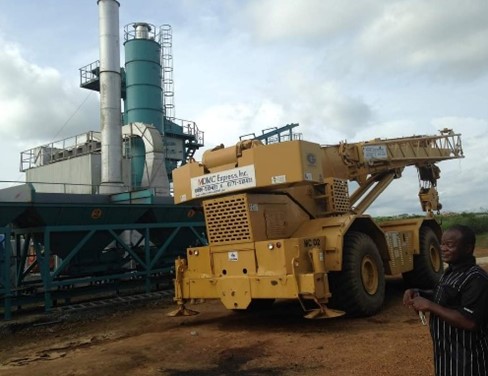The Liberian government’s decision to procure 285 pieces of heavy-duty road maintenance equipment, commonly known as “yellow machines,” has been embroiled in controversy since its initial announcement in May 2024. The intended purpose of these machines was to bolster road construction and rehabilitation efforts throughout the country, with a plan to distribute 19 machines to each of Liberia’s 15 counties. However, the procurement process quickly came under scrutiny due to concerns about transparency and adherence to legal procedures.
Reports surfaced suggesting that the deal was struck through an opaque agreement with South African businessman Robert Gumede of the Guma Group. This agreement allegedly involved granting the Guma Group mining concession rights, specifically for the exploration of Wologizi Mountain in Lofa County. Further fueling public apprehension was the revelation that the deal lacked legislative approval and did not comply with regulations established by the Public Procurement and Concessions Commission (PPCC). These regulations mandate competitive bidding and legislative oversight for such substantial transactions, raising questions about the legality and propriety of the government’s actions.
In response to the growing public outcry, President Joseph Boakai established a special committee tasked with renegotiating the deal. Led by Vice President Jeremiah Koon, the committee aimed to secure more favorable terms for the procurement and shipment of the equipment. Subsequently, Vice President Koon announced that the committee had successfully achieved this objective. He assured the public that all 285 machines would still be delivered, but at a significantly reduced cost of US$22 million, payable over three years starting in the 2025 fiscal year, aligning with the national budget.
Information Minister Jerolinmek Mathew Piah further defended the procurement process, emphasizing the government’s commitment to ensuring the availability of the yellow machines for improving road infrastructure nationwide. He acknowledged the initial public backlash stemming from concerns about the procurement process, highlighting the government’s responsiveness by pausing the deal and forming a committee to re-evaluate it. Minister Piah expressed confidence in the work of the Vice President-led committee, affirming that the quantity and quality of the machines would meet national standards. He drew an analogy to illustrate the government’s pursuit of cost-effectiveness, suggesting that choosing a lower bid is a logical decision and not an indication of wrongdoing by the higher bidder.
The Information Minister also addressed accusations of politicization surrounding the controversy. He contended that those raising concerns were motivated by political gain rather than genuine concern for the public interest. This assertion underscores the politically charged atmosphere surrounding the yellow machines deal, suggesting that the debate has transcended mere procedural concerns and entered the realm of political maneuvering. The government’s defense rests on the assertion that it acted in the best interest of the country by securing a lower price for the much-needed equipment.
The controversy surrounding the procurement of the yellow machines highlights the challenges of balancing the urgent need for infrastructure development with the equally important principles of transparency and accountability. While the government maintains that it has addressed the initial concerns by renegotiating the deal and securing a lower price, questions about the initial lack of transparency and adherence to procurement regulations continue to linger. The public debate raises broader questions about the government’s commitment to good governance and the potential influence of political considerations in public procurement processes. The ultimate impact of this controversy on public trust and the government’s development agenda remains to be seen.














